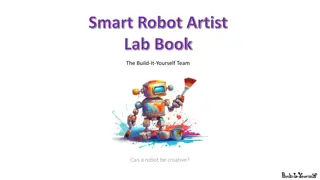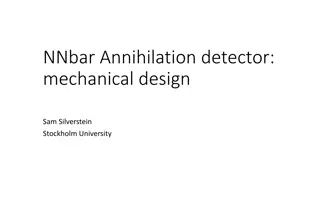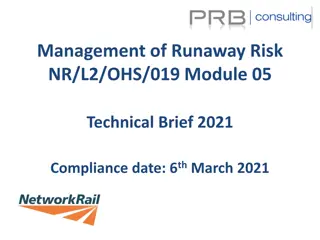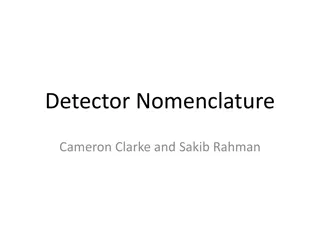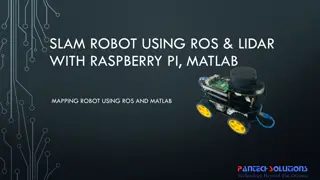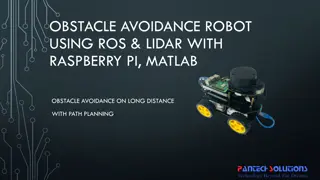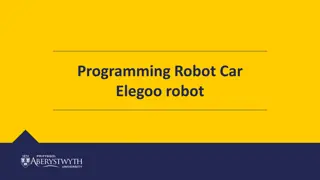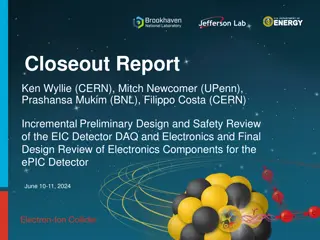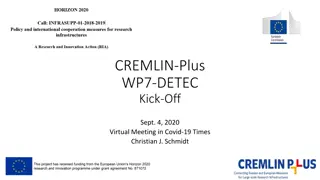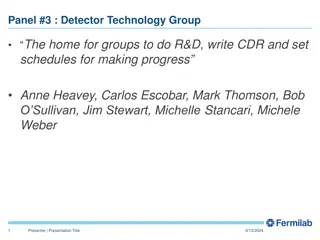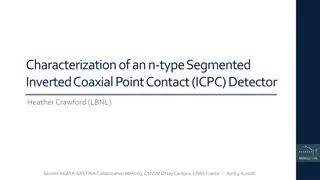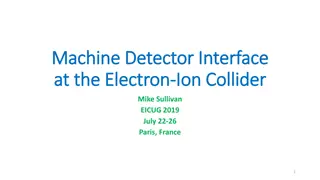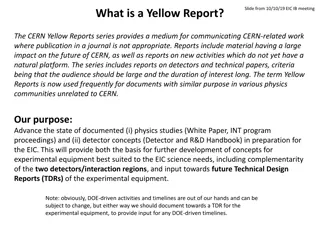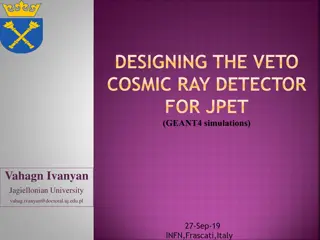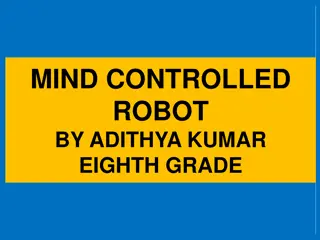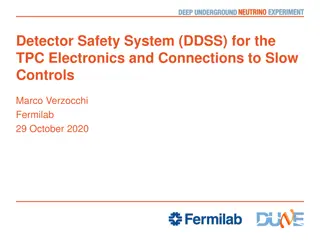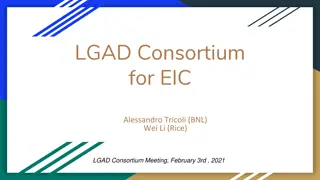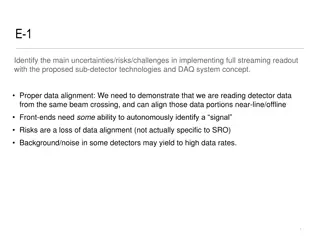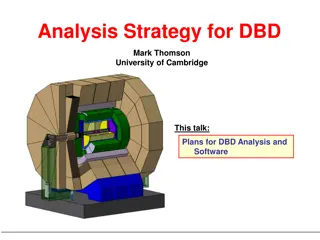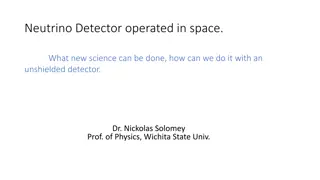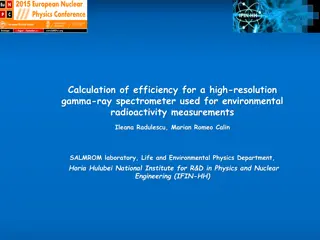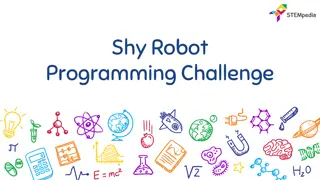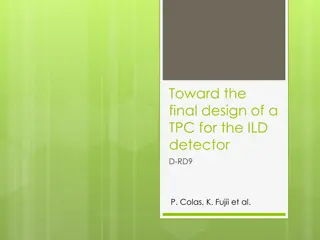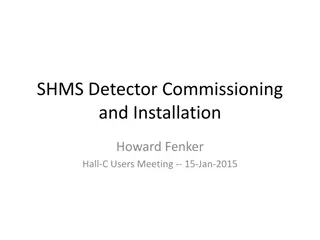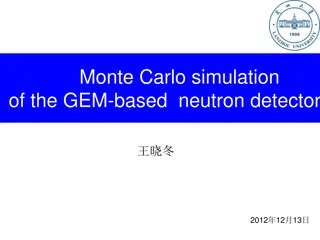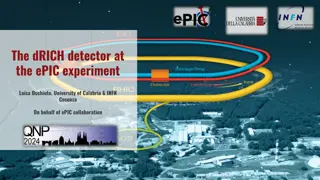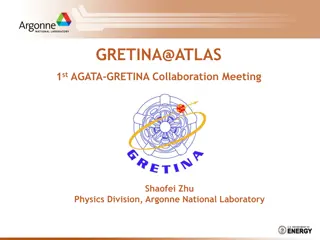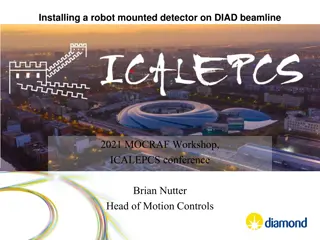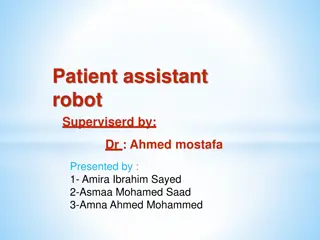ECFA Detector R&D Roadmap and International Collaborations Update
The ECFA Detector R&D Roadmap outlines collaborative efforts in particle physics research, focusing on high-field magnets, muon beams, and more. Task Forces are coordinating community consultations for future experimental programs, with a goal to fulfill strategic needs identified by the ESPP update
0 views • 28 slides
Exploring Creativity in Robotics: Can a Robot Be an Artist?
Delve into the world of robotics and creativity as we ponder the question: can a robot truly exhibit creativity? Join us on a journey to teach a robot to draw creatively, exploring the intersection of technology and artistry. Discover research principles of famous art designs and innovative projects
2 views • 15 slides
NNbar Annihilation Detector Mechanical Design Proposal
This proposal outlines the mechanical design considerations for the NNbar Annihilation Detector, highlighting practical concerns and proposed changes to the baseline design. Topics cover the structure support, component weights, installation challenges, and optimizations for improved detector perfor
2 views • 27 slides
Putzmeister Concrete Pump, concretepumpdepot.com
In our inventory you find a large selection of Putzmeister concrete pump mounted on branded trucks like Volvo, Mack, GMC and many more In our inventory you find a large selection of Putzmeister concrete pump mounted on branded trucks like Volvo, Mack, GMC and many more
2 views • 3 slides
Management of Runaway Risk in Rail Environments - Technical Brief Module 05
This technical briefing by Network Rail addresses the risk of runaway plant in rail environments following a significant accident and regulatory requirements. Module 05 outlines controls, responsibilities, and measures to prevent or reduce the risk of runaways involving rail-mounted plant. Specific
1 views • 11 slides
Advanced Detector Nomenclature and Proposed Segmentation System
This content provides detailed information on detector nomenclature, parts, and a proposed segmentation system for advanced spectrometers. It includes visuals and explanations of ring, septant, coil, and segment identification within the detector, offering insights into the intricate workings of spe
0 views • 4 slides
Mapping Robot using ROS, Lidar with Raspberry Pi & MATLAB
Turtle.bot is a popular product for home service robots, utilizing SLAM and navigation technologies. It features gyro, Kinect sensors, Lidar, and a laptop for mapping. The robot localizes and navigates using ROS in Raspberry Pi connected with MATLAB. ROS (Robot Operating System) is a set of software
0 views • 17 slides
Autonomous Obstacle Avoidance Robot Using ROS, Lidar, and Raspberry Pi with Matlab Path Planning
Obstacle avoidance in robotics has evolved from basic collision avoidance to autonomous path planning with the use of Lidar and ROS. This project involves mapping the environment using Lidar scans and implementing a path planning algorithm in Matlab to navigate around obstacles. By utilizing a Raspb
0 views • 15 slides
Camera Bracket Market ppt
Global Camera Bracket Market Breakdown by Application (Security and Surveillance, Photography and Videography, Action Cameras, Wildlife and Nature Photography, Medical Imaging) by Type (Wall-Mounted Brackets, Ceiling-Mounted Brackets, Floor-Standing
0 views • 8 slides
Micro:bit Robot Entry Tutorial with YahBoom - Buzzer Singing Lesson
In this engaging tutorial series, you will learn how to program a micro:bit robot to sing "Happy Birthday" using a buzzer. Follow step-by-step instructions to set up your micro:bit, connect it to your computer, search for coding blocks, and combine them to create a musical robot. Powered by YahBoom,
2 views • 8 slides
Building and Programming Self-Driving Robot Car with Elegoo Robot
Join the workshop to build and program a self-driving car using the Elegoo Robot and TinkerCAD Circuits. Learn to code functions for driving forward, left, right, backwards, and stopping. Complete the bronze, silver, and gold challenges to enhance your text programming skills. Get started with the c
1 views • 11 slides
Closeout Report: Incremental Design Review of EIC Detector Electronics
Closeout report detailing the progress of the Incremental Preliminary Design and Safety Review of the EIC Detector DAQ and Electronics, along with the Final Design Review of Electronics Components for the ePIC Detector. The report includes responses to charge questions, panel reviews, comments, reco
0 views • 23 slides
Neutrino Detectors for NuStorm: Physics Goals and Detector Requirements
Physics goals for neutrino detectors in the NuStorm project include measuring exclusive neutrino cross sections, supporting long baseline programs, searching for sterile neutrinos, and improving measurements. Detector requirements involve reconstructing neutrino interactions, providing charge and pa
0 views • 21 slides
Proposal for Play Area Signage Improvement
Playground inspection reports highlighted the need for signage improvements in play areas across the parish. Tony has researched guidelines and proposed a set of possible signs with cost estimates from Wicksteed. The options include various sign types and sizes, with two signs suggested for each pla
0 views • 15 slides
WP7-DETEC Kick-Off Meeting: Advancing Detector Technologies for Particle Physics
WP7-DETEC is a collaborative initiative focusing on the development of state-of-the-art detector technologies in the fields of nuclear physics and high-energy physics. The kick-off meeting aims to foster cooperation, exchange ideas, and educate young scientists in the field. Activities include sessi
0 views • 7 slides
Detector Technology Group: Research & Development Strategies
The Detector Technology Group focuses on R&D for detector technology, setting schedules to make progress. Discussions include short-term approaches for describing detectors, collaboration participation, and decision-making. Activities at CERN and Fermilab are reviewed to address any missing R&D area
0 views • 8 slides
Innovative n-Type Segmented Inverted Coaxial HPGe Detector Study
Comprehensive characterization of an n-type Segmented Inverted Coaxial Point Contact (ICPC) detector by Heather Crawford at the AGATA-GRETINA collaboration meeting. The study focuses on energy resolution, drift time corrections, azimuthal angle and full position reconstruction, along with in-beam ch
0 views • 29 slides
Challenges and Considerations in Electron-Ion Collider Detector Development
Exploring the development of detector systems for Electron-Ion Colliders (EIC) involves addressing various issues such as detector acceptance for low Q2 and high Q2, unique beam characteristics, and the need for specialized components like bend magnets and polarimeters. Key considerations include po
0 views • 16 slides
Communication Strategies and Reports for Advancing Physics Studies and Detector Concepts at EIC
CERN Yellow Reports provide a platform for sharing impactful work related to CERN, including reports on detectors, technical papers, and new activities. The goal is to advance physics studies and detector concepts in preparation for the EIC, focusing on quantifying physics measurements, implications
0 views • 10 slides
Designing Veto Cosmic Ray Detector for JPET Using GEANT4 Simulations
Creating the Veto Cosmic Ray Detector for JPET involves designing the current version of Veto JPET, incorporating 42 scintillators, detecting 4 GeV cosmic muons, generating cosmic muon distribution, and simulating energy deposition inside the veto scintillators. The process includes particle generat
0 views • 26 slides
Understanding Detector Response in SIDIS He3 Experiment
Introduction to analyzing hit and occupancy rates from different particle sources in the SIDIS He3 experiment. Explore the simulation data to determine event rates based on detector channels. Examples include pi0 sources and eDIS from the target. Various occupancy cuts are applied, and thresholds ar
0 views • 22 slides
Mind Controlled Robot Project by Adithya Kumar - Eighth Grade
Adithya Kumar, an eighth-grade student, has designed a groundbreaking Mind Controlled Robot project that allows users to control a robot using brain waves. The project utilizes a Mindwave EEG headset, Arduino Uno motherboard kit, and various materials. Adithya's detailed experimental design and proc
0 views • 11 slides
Detector Safety System (DDSS) for TPC Electronics and Connections to Slow Controls
The Detector Safety System (DDSS) for TPC Electronics involves multiple protection levels including slow controls, PLC-based systems, and fuses/diodes to ensure detector safety. It's crucial to consider these aspects during the design phase as modifications post-design are challenging. The system, d
0 views • 20 slides
LGAD Consortium for EIC: Advancing Detector Technologies
The LGAD Consortium aims to foster the development of detector technologies based on LGAD sensors for the Electron-Ion Collider (EIC) and future projects. By creating a collaborative effort, sharing expertise, and bringing together those interested in LGAD-based detectors, the consortium seeks to ad
0 views • 9 slides
Challenges and Common Solutions in Implementing Full Streaming Readout for Sub-Detector Technologies
Implementing full streaming readout with proposed sub-detector technologies and DAQ system concept poses challenges including proper data alignment, risks of data loss, and background noise affecting data rates. The transition point for electronic components from detector-specific to common solution
0 views • 9 slides
Development of Silicon Tracker and Sensor Technology for sPHENIX Detector
Research and development efforts are underway for silicon tracker and sensor technology to enhance the functionality of the sPHENIX detector. The project aims to improve mass resolution, cover specific areas effectively, and optimize sensor configurations. Various sensor concepts are being explored
0 views • 25 slides
Analysis Strategy for DBD by Mark Thomson - University of Cambridge
Mark Thomson from the University of Cambridge presented the analysis strategy for the Dual-Beta Detector (DBD) at the ILD Analysis Meeting in Paris, focusing on software models, reconstruction, and validation plans. The strategy includes goals to ensure required physics analyses, develop software mo
0 views • 11 slides
Exploring Neutrino Science in Space with Unshielded Detector - Opportunities and Innovations
The deployment of a neutrino detector in space presents a unique opportunity to conduct groundbreaking scientific research, leveraging the intense neutrino flux closer to the Sun. Key areas of focus include studying rare fusion neutrinos, observing neutrino oscillations during spacecraft transitions
0 views • 11 slides
Understanding Robot Localization Using Kalman Filters
Robot localization in a hallway is achieved through Kalman-like filters that use sensor data to estimate the robot's position based on a map of the environment. This process involves incorporating measurements, updating state estimates, and relying on Gaussian assumptions for accuracy. The robot's u
0 views • 26 slides
Efficiency Calculation of High-Resolution Gamma-Ray Spectrometer for Environmental Radioactivity Measurements
SALMROM laboratory at IFIN-HH conducts environmental radioactivity monitoring using high-resolution gamma-ray spectrometry. The system includes a Coaxial p-type HPGe detector with reliable traceability. Activities involve evaluating radon concentrations in various environments and assessing radionuc
0 views • 13 slides
Shy Robot Programming Challenge: Logic-Based Autonomous Robot
The Shy Robot is an autonomous robot equipped with two IR sensors to avoid obstacles. Its behavior is determined by a logical control system - moving backward if both sensors detect an object, turning right if only the left sensor detects an object, turning left if only the right sensor detects an o
0 views • 5 slides
Final Design of ILD Detector TPC - Towards Improved Performance
The final design of a Time Projection Chamber (TPC) for the ILD detector is detailed in this report, showcasing advancements made from 2007 to 2014. The project, D_RD9, focuses on addressing engineering challenges such as electronics, cooling, and software to enhance the TPC's feasibility and functi
0 views • 17 slides
SHMS Detector Commissioning and Installation Updates
Status updates on the commissioning and installation progress of the SHMS detector system, including the noble gas Cerenkov mount optics, mirrors, drift chambers, and various hodoscopes. Details on the system status, high voltage signal cables, DAQ, gas computing, and schedules for detector installa
0 views • 9 slides
Monte Carlo Simulation of GEM-Based Neutron Detector and Detector Performance Analysis
A detailed exploration of Monte Carlo simulations for GEM-based neutron detectors, investigating their detection efficiency and performance characteristics. Various detector designs and concepts, including multi-layer converters and GEM detectors, are discussed, along with simulation results on sign
0 views • 12 slides
Performance Studies of dRICH Detector at ePIC Experiment
The Electron-Ion Collider ePIC experiment focuses on the performance studies of the dRICH detector for particle identification crucial in various physics channels. The detector features aerogel optimization, SiPM sensors, and test-beam analyses. Key capabilities include different techniques for part
0 views • 28 slides
Advances in Nuclear Physics Research at AGATA-GRETINA Collaboration Meetings
Cutting-edge research opportunities in nuclear physics using sophisticated devices like GRETINA at ATLAS, focusing on Coulomb excitation, deep inelastic reactions, and transfer reactions for studying neutron-rich nuclei. The installation of GRETINA involves technical support, equipment upgrades, and
0 views • 20 slides
Installation of Robot-Mounted Detector on DIAD Beamline
Installing a robot-mounted detector on the DIAD beamline for the 2021 MOCRAF Workshop at the ICALEPCS conference. The robot arm holds a diffraction detector for dual imaging and diffraction purposes, ensuring safety for personnel, equipment, and integration into EPICS and GDA systems. Functionality
0 views • 28 slides
Overview of SiD Workshop Summary and DBD Planning
The SiD Workshop at the University of Oregon in November 2010 focused on the Summary of DBD Planning by Andy White. Key points covered included the timeline from Fall 2007 to End 2012, the Detailed Baseline Design DBD with nine crucial points, guidance for DBD presenters, and the importance of final
0 views • 29 slides
Futuristic Patient Assistant Robot Enhancing Healthcare
This research project introduces a patient assistant robot supervised by Dr. Ahmed Mostafa and presented by a team comprising Amira Ibrahim Sayed, Asmaa Mohamed Saad, and Amna Ahmed Mohammed. The robot aims to assist individuals with infectious diseases by providing essential care and isolating them
0 views • 22 slides
Universal Collaborative Robot Platform Revolutionizing Robotics Industry
The Universal Collaborative Robot Platform is a game-changer in the robotics world, providing full autonomy, innovation, creativity, and enhanced productivity through robot collaboration. With features like universal robot communication protocols, centralized fleet management, mobile autonomy, and A
0 views • 14 slides

